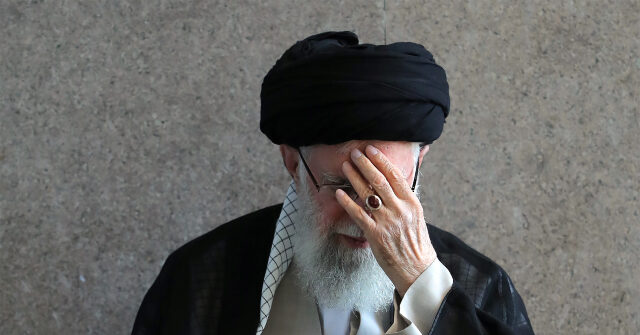Iran’s “supreme leader,” dictator Ayatollah Ali Khamenei, delivered a speech on Sunday demanding complete submission to his regime from the Iranian people, describing national “unity” as an “iron shield” to defend against America and Israel.
Khamenei made his comments in the context of the beginning of a holiday known as “Government Week” in Iran. According to the state-run propaganda site PressTV, Government Week marks “the week leading up to the 1981 martyrdom anniversary of Iran’s then president Mohammad Ali Rajaei and Prime Minister Mohammad Javad Bahonar.” Other state outlets described Khamenei’s appearances as related to the anniversary of the death of Imam Reza, the eighth imam of Shia Islam. More immediately, the comments followed weeks of debate, some of it spilling into the public, among political heavyweights in Iran, many of whom began to demand the ayatollah seek negotiations with the United States after airstrikes are believed to have destroyed three of Iran’s most important nuclear developments sites.
Multiple reports throughout August have identified members of the prior “moderate” administration of former President Hassan Rouhani as making public statements and writing articles suggesting that some form of negotiation with America was necessary to preserve the regime – a stark contrast to Khamenei’s own rejection of any contact with the administration of President Donald Trump. President Masoud Pezeshkian, who campaigned as an alleged “moderate,” also toed the line this week, issuing repeated comments demanding “unity” from the Iranian people behind Khamenei’s defiant rejection of any attempts to improve relations with Washington.
In his remarks on Sunday, Khamenei insisted that normalizing ties to the United States was impossible because Washington sought to subjugate Iran.
“The US wants Iran to be obedient to it,” he claimed, according to a translation by the regime-friendly al-Manar news network in Lebanon. “The Iranian nation is deeply offended by such a great insult and will stand with all its strength against those who harbor such a false expectation of the Iranian people.”
Khamenei insulted politicians in Iran who encouraged negotiations with the United States as “shallow-minded” and demanded an end to any discussions about alternative ways of addressing the country’s current weakened diplomatic state.
“Ayatollah Khamenei urged all people, officials, and intellectuals to wholeheartedly preserve and strengthen the iron shield of the current great national unity,” al-Manar reported. “He also said that all people and groups should support the hardworking President Masoud Pezeshkian.”
Another pro-regime Iranian news outlet, Tasnim News, emphasized that Khamenei reiterated that Iran won what has become commonly known as the “12-Day War” in June, when Israel launched a massive military operation to weaken Iran’s ability to attack the country. The United States joined the operation by approving the bombing of three Iranian nuclear sites – the uranium enrichment facilities at Natanz, Fordow, and Isfahan – on June 21, which President Donald Trump described as a “spectacular military success.” Most experts, including leaders at the International Atomic Energy Agency (IAEA), stated after the attack that they believed the sites’ ability to enrich uranium had been largely destroyed. Despite the tremendous losses to the Iranian regime and minimal losses on the Israeli and American sides, Khamenei proclaimed that the two had suffered “bitter defeats” in June.
“Ayatollah Khamenei said Iran’s adversaries have realized from ‘their bitter defeats in military attacks’ and from the ‘firm resistance and unity of the Iranian nation, officials, and Armed Forces,’” Tasnim relayed, “that neither the people nor the Islamic Republic can be subdued by war or forced into obedience.”
“That is why the enemies now pursue their objectives through creating discord in Iran,” Khamenei added.
“The Leader cautioned against internal agents, Zionist influence, and careless voices that may fuel discord, while praising the Iranian people for maintaining unity despite political or social differences,” Tasnim added.
The emphasis on “preserving unity among all strata of society, between the people and the administration” from the “supreme leader” follows rumblings of opposition to the intransigence of the regime in the past year. The independent outlet Iran International described a “fierce battle” within the Iranian government erupting last week, led in part by former President Rouhani and former Foreign Minister Mohammad Javad Zarif, who served under Rouhani. Rouhani’s administration was responsible for the negotiations that led to President Barack Obama’s 2015 “Joint Comprehensive Plan of Action” (JCPOA), the nuclear agreement that lifted major sanctions on Iran and allowed it to dramatically expand its spending on foreign terrorist adventures in the Middle East and Latin America.
Zarif reportedly wrote an op-ed on August 15 calling for expanding “democracy” in the country, a non-starter for Khamenei, to ensure domestic stability and put Tehran in a stronger position to address its turbulent foreign policy.
“Outlets close to the Supreme Leader and the Revolutionary Guards — including Kayhan, Javan, and Vatan Emrooz — denounced the proposals as treasonous, delusional, and ‘capitulation’ to the West,” Iran International noted.
Shortly before Zarif weighed in, a group of alleged “moderates” called the “Reform Front” published a letter similarly urging Khamenei to employ a softer touch toward the West, “including a voluntary suspension of uranium enrichment, the release of political prisoners and an end to the repression of dissent.” Khamenei has aggressively rejected all reforms respecting human rights and the Pezeshkian administration has repeatedly reiterated that the country will not accept any limits on uranium enrichment.
“The aftermath of the recent 12-day war with Israel, coupled with runaway inflation, industrial stagnation, the collapse of the national currency and capital flight, had created a more acute risk of economic paralysis than ever before,” the alleged “reformers” wrote.
Rouhani himself appeared in some quotes in Iranian local media suggesting friendlier ties to the West.
“If we can improve relations with Europe, our neighbors, and both East and West—even reduce tensions with the United States—and it serves our interests, then why not?” he purportedly asked. “Not only is there nothing wrong with it, it is our duty and obligation.”
Follow Frances Martel on Facebook and Twitter.
Read the full article here


